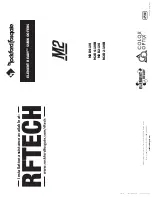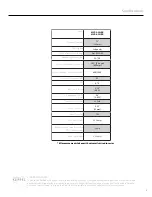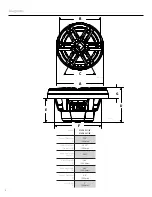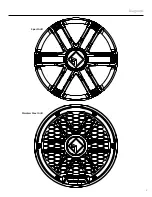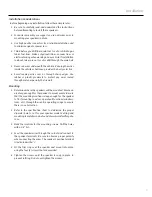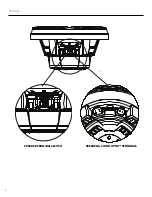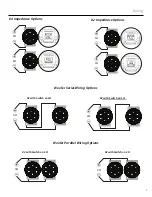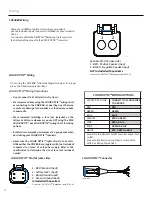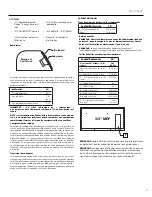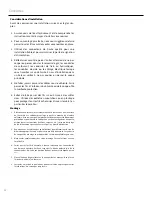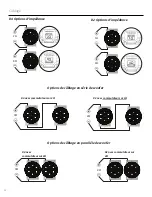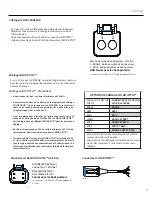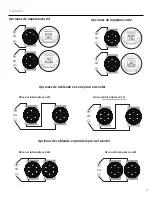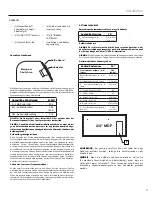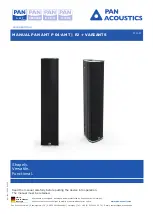
6
• (1)Element Ready
™
Subwoofer with Sport/
Stainless Grill
• (6) Socket Head Stainless
Screws
• (1) COLOR OPTIX™ Harness
• (1) 1/8” Drill Bit
• (1) Socket head driver bit
• Installation and Operation
Manual
Installation
OPTIMAL ENCLOSURE
Infinite Baffle
An Infinite Baffle enclosure design represents an application where
the compliance of the air volume within the enclosure is greater than
the compliance on the speaker’s suspension (Vas). An infrasonic filter
is required for reliable performance.
Infinite Baffle
10”
F
3
- 3dB Point (Hz)
49.2
Vas - cu. ft. (Liter)
1.56
(44.2)
Qtc - Enclosure Damping
0.74
IMPORTANT: A subsonic or “infrasonic” filter at or above the
resonant frequency (Fs) of the speaker is required.
NOTE:
Infinite baffle installations will result in lower speaker
power handling when compared to fully enclosed applications
such as sealed or vented enclosures.
Wiring Configurations
By varying the wiring configuration of your speakers you can create
an impedance load to match your system. Altering the wiring configu-
rations gives a range of options for impedance loads. Series, Parallel,
or Series-Parallel wiring configurations are different techniques for
wiring speakers that provide different loads. Series configuration is a
string method where speakers are wired end to end. Parallel configu-
ration uses two or more speakers wired across common terminals.
Series-Parallel configuration combines both techniques. Choose the
wiring diagram that corresponds to the number of woofers and the
impedance of your amplifier.
Subwoofer Crossovers
There are two operational types of crossovers, passive and active.
Passive crossovers (coils or inductors) are placed on the speaker
leads between the amplifier and speaker. An active crossover is an
electronic filter that separates the audio signal fed to different ampli-
fiers. For optimum subwoofer performance, we recommend using an
active 80-100Hz low-pass crossover at 12dB/octave.
Storage or
Cavity Area
Baffle Board
Subwoofer
OPTIONAL ENCLOSURE
Recommended Sealed Enclosure Volume Range
Sealed Enclosures
10”
V
b
- Volume range cu. ft. (Liter)
0.75 to 1.25
(
21.24 - 35.4
)
Vented Enclosures
NOTE: Vb is the internal volume, before any speaker and/or port
displacement is added. All external dimensions were based on
the use of 3/4” (1.90cm) materials.
NOTE:
When using enclosures other than recommended, call
Technical Support for correct application.
Optimum Vented (Ported) Enclosure Sizes
Vented Enclosures
10”
Total Internal Volume cu. ft. (Liter)
1.45
(41.06)
Woofer Displacement cu. ft. (Liter)
0.1 (2.83)
Port Displacement cu. ft. (Liter)
0.1 (2.83)
V
b
- Net Internal Volume cu. ft. (Liter)
1.25 (35.4)
F
B
- Tuning Frequency (Hz)
40
F
3
- 3dB Point (Hz)
39
H - Height - inch (cm)
15.0 (38.1)
W - Width - inch (cm)
15.0 (38.1)
D - Depth - inch (cm)
15.25 (38.74)
P - Port Diameter and Length - inch (cm)
3 x 9.5
(
7.62 x 24.13
)
NOTE:
The port shown can be placed on any face of the enclosure as
long as the port ends are not obstructed.
NOTE:
When using vented enclosures, for maximum reliability and
power handling ensure, that a subsonic or “infrasonic” filter is used
so that only usable low frequency signal is sent to the subwoofer.
Contents
3/4" MDF
H
W
D
P

